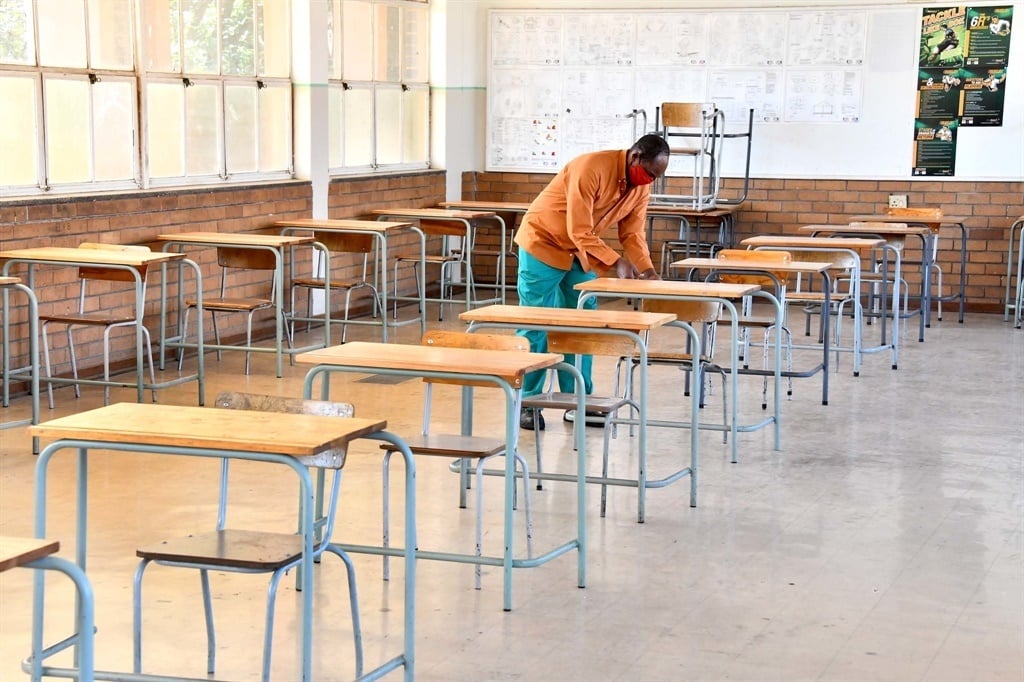


Fumigation of a school in preparation for opening under Level 3 lockdown.
Let’s use the COVID-19 pandemic as the catalyst for a much-needed way of catching up learners – now and long after our masks come off, write Kristal Duncan-William and Merle Mansfield.
With schools having resumed in a phased approach from 8 June 2020, learners are not just dealing with lags in learning brought about by the 60-day lockdown period; many are confronted by knowledge gaps set in place long before the Covid-19 pandemic took hold.
As 28-year old Thabang from the Youth Capital network puts it: “When I repeated Grade 7, I didn’t have any support and other kids made fun of me. Luckily, that just pushed me to work harder and I passed, but friends in the same situation couldn’t cope and dropped out.” Thabang’s story is all too common in South Africa, where only 37% of those who start Grade 1 complete matric 12 years later – an unsurprising statistic given the constant game of catch-up our learners have to play from early on in their school careers.
Think of the school curriculum like a game of Jenga – the blocks interlock with one another and the more gaps in the tower, the more likely it is to fall. In South Africa, the Admission Policy for Ordinary Public Schools states that learners can only repeat one grade per phase (foundation, intermediate or senior phase); failing a grade for the second time in the same phase means being progressed to the next grade, regardless of knowledge gaps.
While this policy recognises the need for individualised support to assist learners with these gaps, the implementation of this support is incredibly difficult given the lack of resources in most South African schools. Ultimately, the policy places an administrative burden on schools, having only one additional year per phase to catch up a learner who lags behind.
Teachers don’t have additional resources to develop individual support plans for these learners: this includes identifying barriers, designing interventions and, if needed, sourcing further educational assessments.
At the end of the day South African learners simply do not have the support they need, when they need it to stay on track with their grade – and the results speak for themselves. According to the 2016 Progress in International Reading Literacy Study (PIRLS), for example, 78% of South African Grade 4 children could not read for meaning in any language – including their home language. Think of the Jenga tower again: if learners struggle to understand what they read, how can they build new knowledge in their education journey? This is especially true for under-resourced schools.
Covid-19 has magnified these longstanding inequalities in our education system. Even though the Department of Basic Education made learning resources available on many platforms, economics researcher Nic Spaull notes: “If one is realistic, for the poorest 80% of learners in South Africa there is virtually no curricular learning that is taking place during lockdown”.
Now, more than ever, is the time to devise a long-term and comprehensive national catch-up strategy that our learners so desperately need, rather than quick-fixes that simply mask the problem.
At implementation level, the strategy needs to make provisions for additional mechanisms for schools to provide individualised learners support and assessment. This could be achieved by strengthening the role played by NGOs and leveraging existing public works programmes.
Khula Development Group, a partner of the Zero Dropout campaign, has shown the effectiveness of assisting schools with learner support. The group has been working with primary schools learners in Paarl to ensure they have a nurturing adult present in their lives and a personalised catch-up curriculum.
Moreover, learning barriers are identified as a stumbling block: those with severe learning disabilities are helped until they can be referred to a special or skills school.
The results have proven that the longer a learner was in this programme the greater the gains in their overall wellbeing in Grade 12, including educational outcomes. It also shows why we need a robust referral system to expedite learners’ access to additional support measures.
Lastly, existing initiatives such as public works programmes and the National Youth Service could be used to provide much-needed additional human resources within the education system. Community Work Programme workers have been increasing access to early childhood development through NGO partners such as Nal’ibali.
These initiatives can be an effective win-win for the country: schools would gain administrative support while young people would be provided with work experience and a career pathway.
In the meantime, we must ensure that we are using every available resource to bring some learning and intellectual stimulation to children who are not in school. As we write, there are many local educational websites that are on the official zero-rated list, but have yet to be zero-rated by mobile network operators. Each day without any education erodes our children’s prospects just that bit more.
Minister Angie Motshekga admitted that the pandemic is forcing the Department to ‘re-engineer’ the education system. Beyond Covid-19, this is the opportunity our system has needed for a long time. Policymakers should use it wisely to implement urgent reforms that benefit all of our learners.
Kristal Duncan-Williams is the Project Lead of Youth Capital, a youth-led campaign with an Action Plan for change that combines data with young people’s lived stories to switch gears on youth unemployment. Find out more at www.youthcapital.co.za.
Merle Mansfield is the Programme Director of Zero Dropout, a national campaign working towards halving the rate of school dropout by 2030. Find out more.

